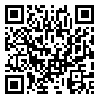Volume 5, Issue 2 (June 2018)
Health Spiritual Med Ethics 2018, 5(2): 45-50 |
Back to browse issues page
Download citation:
BibTeX | RIS | EndNote | Medlars | ProCite | Reference Manager | RefWorks
Send citation to:



BibTeX | RIS | EndNote | Medlars | ProCite | Reference Manager | RefWorks
Send citation to:
Ghoreishi Rad F S, poorjabbar akhuni F. Relationship between Religious Commitment and Other Factors Related To Tendency toward Extra-Marital Affairs among Married Students. Health Spiritual Med Ethics 2018; 5 (2) :45-50
URL: http://jhsme.muq.ac.ir/article-1-232-en.html
URL: http://jhsme.muq.ac.ir/article-1-232-en.html
1- Department of Psychology. Faculty of Education and Psychology Sciences, Azerbaijan Shahid Madani University, Tabriz, Iran.
2- Department of Psychology. Faculty of Education and Psychology Sciences, Azerbaijan Shahid Madani University, Tabriz, Iran. ,faribapoorjabbar0@gmail.com
2- Department of Psychology. Faculty of Education and Psychology Sciences, Azerbaijan Shahid Madani University, Tabriz, Iran. ,
Abstract: (4394 Views)
Background and Objectives: Extra-marital affairs as one of the covert social problems are among issues with a wide range of disastrous consequences for family and social institutions. Therefore, determining the factors associated with the tendency toward such relationships is of great importance. We aimed to study the tendency toward extra-marital affairs and some related factors among married students.
Methods: A cross-sectional study of 250 students of Tabriz University of Medical Sciences was performed. The participants were chosen through the convenience sampling method. The data collection tools included the Religious Commitment Inventory-10 (Worthington et al.), NEO Personality Inventory, inclination toward extra-marital affairs by Whatley, and the social reflexivity scale (Kharmour and Afrasiabi). To analyze the data, Pearson correlation coefficient, t-test, and multivariate regression were run.
Results: We found a negative correlation between religious commitment and tendency toward extra-marital affairs (P=0.000, r=-0.37). However, the extent of modern media usage and social reflexivity and inclination toward extra-marital affairs were positively correlated (P=0.000, r=0.42). Moreover, extroversion, openness to experience, adaptability, and conscientiousness were negatively correlated with inclination toward extra-marital affairs. Finally, neuroticism was positively correlated with inclination toward extra-marital affairs (P=0.001, r=0.18).
Conclusion: By promoting media literacy among students regarding the proper use of the modern media, as well as strengthening religious and indigenous values and traditions, the inclination of married students towards extra-marital affairs can be greatly reduced.
Methods: A cross-sectional study of 250 students of Tabriz University of Medical Sciences was performed. The participants were chosen through the convenience sampling method. The data collection tools included the Religious Commitment Inventory-10 (Worthington et al.), NEO Personality Inventory, inclination toward extra-marital affairs by Whatley, and the social reflexivity scale (Kharmour and Afrasiabi). To analyze the data, Pearson correlation coefficient, t-test, and multivariate regression were run.
Results: We found a negative correlation between religious commitment and tendency toward extra-marital affairs (P=0.000, r=-0.37). However, the extent of modern media usage and social reflexivity and inclination toward extra-marital affairs were positively correlated (P=0.000, r=0.42). Moreover, extroversion, openness to experience, adaptability, and conscientiousness were negatively correlated with inclination toward extra-marital affairs. Finally, neuroticism was positively correlated with inclination toward extra-marital affairs (P=0.001, r=0.18).
Conclusion: By promoting media literacy among students regarding the proper use of the modern media, as well as strengthening religious and indigenous values and traditions, the inclination of married students towards extra-marital affairs can be greatly reduced.
Keywords: Social Reflexivity, Religious Commitment, Communication Media, Extra-Marital Affairs, Personality Characteristics.
Type of Study: Original Article |
Subject:
General
Received: 2018/02/22 | Accepted: 2018/04/25 | Published: 2018/05/31
Received: 2018/02/22 | Accepted: 2018/04/25 | Published: 2018/05/31
Send email to the article author
| Rights and permissions | |
 |
This work is licensed under a Creative Commons Attribution-NonCommercial 4.0 International License. |









